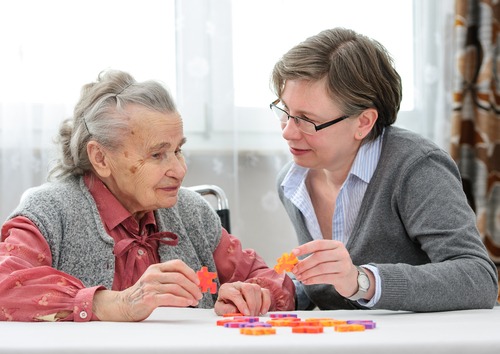According to a study conducted by researchers from the University of California-San Francisco, which was published in the journal JAMA Internal Medicine, hypoglycemia may increase the risk of dementia later in life.
The study focused on diabetics who are more apt to suffer from not only elevated blood sugars but low blood sugars as well. Because elevated blood sugars can cause a variety of health problems over time like cellular damage, diabetic treatments focus on lowering blood sugar levels. But sometimes, blood sugar can drop too much and hypoglycemia is the result.
Researchers are now speculating that these low blood sugars may explain the increased rates of dementia seen lately in diabetes patients. The studies looked at 783 senior diabetes patients with a median age of 74. Tracking their history the researchers found that over the course of 12 years, 61 of the patients experienced at least one hypoglycemic event while 148 patients developed some form of dementia, such as Alzheimer’s disease.
“These results provide evidence for a reciprocal association between hypoglycemia and dementia among older adults with DM,” the researchers wrote.
What Exactly Is Dementia?
Dementia is not actually one specific disease but rather a term that describes a host of symptoms associated with the decline in memory and cognitive skills severe enough to diminish a person’s ability to perform common daily activities. Although Alzheimer’s disease accounts for about 60 to 80 percent of dementia cases, other cases can be attributed to strokes and various health conditions.
While symptoms of dementia can vary significantly, the following core mental functions are usually impaired to some extent:
- Memory
- Communication and language
- Reasoning and judgment
- Visual perception
- Ability to focus and pay attention
Problems with memory make it difficult for individuals to keep track of personal items such as money and car keys, pay bills on time, prepare meals, remember doctor’s appointments, and live life independently.
Hypoglycemic Events become more Common as Patients get Older
The study also uncovered a troubling find: hypoglycemic events become more common as diabetes patients age. Though researchers are not clear why this is the case, they suspect a decrease in kidney function and the body’s ability to metabolize drugs properly (including diabetes medication) when people age is most likely the reason.
Hypoglycemic incidents can be dangerous if left untreated and, according to Dr. Stuart Weinerman, an endocrinologist in Great neck, N.Y., anyone taking blood sugar medication should watch for certain warming signs such as blurred vision, confusion, jitteriness, heart palpitations and fainting.
All of these findings point to an important fact – that doctors must be ever vigilant and not focus so much on keeping their patients’ blood sugars so low that they unintentionally create other risks.
Kristine Yaffe, MD, the primary author of the study and a geriatric neuropsychiatrist at the University of California, San Francisco has said, “[Treatment] shouldn’t be so aggressive that you get hypoglycemia.”
Patients also need to be encouraged even more as they age to monitor – or have a family member monitor – their blood sugar levels carefully so they are not administering too much insulin which can cause a hypoglycemic event to occur.
Cognitive Disorders and Medication Management
While more studies need to be conducted to determine the exact correlation between hypoglycemia and dementia, Yaffe suggests that the mechanics appear fairly straightforward – low blood sugar starves the brain and eventually causes damage and death to its neurons.
The crux of this study is that it can be quite difficult to manage diabetes no matter what the patient’s age. Many people with diabetes are also on other medications to help them control their blood pressure, cholesterol or heart problems. Even younger people with no cognitive impairment can have a hard time keeping track of all of their medications, but with aging people, managing medications becomes difficult and dangerous.
Dr. Jeffrey Halter, director of the Geriatrics Center at University of Michigan and an expert on diabetes care in the elderly says, “Someone with a cognitive disorder is at much greater risk for mixing up doses or taking a double dose.” These people are then more likely to have hypoglycemic events and the vicious cycle continues.
Having diabetes is hard and frustrating enough but the numerous health complications that go along with it are downright frightening. Wouldn’t it be great if some day there was a 100% natural protocol that could completely reverse the root cause of your blood sugar imbalance?
One medical expert says this is not only possible, but that patients can do it without needing to take any potentially harmful medications.
Sound too good to be true?
In the free video on the very next page, she shares the details of this diabetes-reversing method and how you can learn a few simple tweaks to what you eat and how you move that can engineer a metabolic reboot so you can maintain healthy blood sugar levels for the rest of your life.
She even shares one specific step you can try immediately to help you get control of your diabetes today.
If you’d like to learn the strategies and tools to fix your blood sugar system without relying on drugs watch the video now.
 Validating...
Validating... 





Leave a Reply